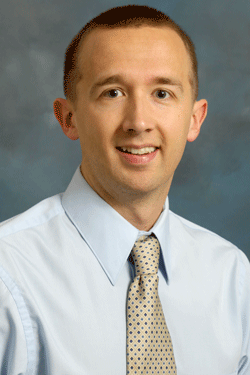Sleep apnea linked to serious, chronic health problems in many adults
March 26, 2010

Chris Kline
The University of South Carolina is seeking volunteers for an ongoing study on the role of physical activity in reducing the severity of sleep apnea and its associated consequences, such as daytime sleepiness, impaired sleep quality, and hypertension)
The study, funded by a grant from the Centers for Disease Control and Prevention to researcher Chris Kline at the Arnold School of Public Health, is for men and women age 18-55 who have previously been diagnosed with sleep apnea or have the major symptoms associated with sleep apnea (heavy snoring, waking up short of breath or gasping for breath, daytime sleepiness).
Participants will have an overnight sleep evaluation and then will be assigned to a 12-week physical activity program, in which they will receive personal guidance and assistance. They also will receive a free exercise stress test before and after the study and six months of exercise at the Public Health Research Center on Assembly Street. At the completion of the study, participants will receive $300.
Kline said studies indicate that between 10-15 percent of Americans suffer from sleep apnea, with the likelihood increasing with age and elevated body weight. However, many people with sleep apnea go undiagnosed until a health problem prompts medical attention. Even when sleep apnea is diagnosed, as many as 50 percent of sufferers do not comply with the standard prescribed treatment, called continuous positive airway pressure (CPAP).
“Research is rapidly accumulating linking sleep apnea to debilitating chronic health conditions, including cardiovascular disease, diabetes, mood disturbances and hypertension,” Kline said. “Although CPAP is effective when used properly, the lack of compliance indicates that other treatment options need to be considered.”
Some studies have even shown that untreated sleep apnea leads to an increased risk of death. Although studies have suggested that physical activity may be very useful in reducing sleep apnea, no well-controlled studies have been conducted, Kline said. “The University of South Carolina study will be the first to systematically research this question,” he said.
The study is ongoing and preliminary results are positive. “Although these are very early results, anecdotal reports thus far are promising,” Kline said.
To be eligible to participate in the study, individuals need to be not currently receiving treatment for their sleep apnea, be free of significant health problems – including heart disease or COPD — and not currently taking part in regular exercise.
For more information, contact Chris Kline at 803-777-2666.



_01.jpg)
_02.jpg)